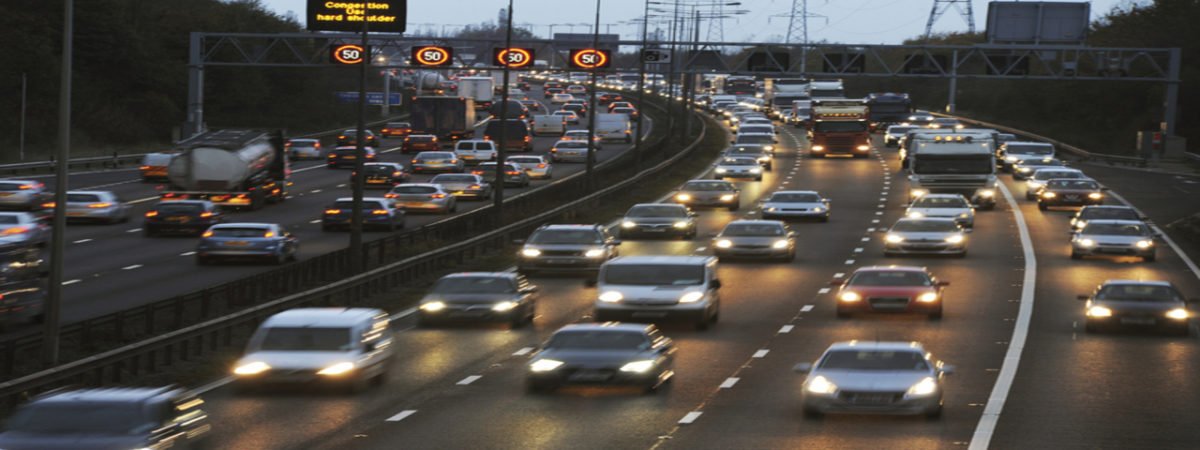For many of us, sliding behind the wheel of our car is a fantastic way to unwind and relax. Yet for others, driving can be a source of frustration, stress and anxiety. Or worse still, road rage; turning the regular commute into the most fraught part of each day.
Worryingly, what we call ‘Road Rage’ plays a part in 66% of driving fatalities. Of 10,000 Road Rage incidents recorded during a seven-year period, 218 resulted in death and over 12,000 injuries.
So, with Road Rage clearly such a major problem on our roads, is there anything we do to change this? To find some answers, we’ve looked into the most common symptoms that can cause Road Rage and explored some useful remedies. We’re calling it our Top 10 tips for how to avoid Road Rage:
Road Rage Tip 1: Avoid competition
There’s something about driving that can bring out a person’s competitive edge. Quiet roads become drag-racing strips. Motorways turn into Formula One tracks. Roundabouts resemble chicanes. And our fellow drivers are all competitors in a race to the next junction.
Perhaps it’s this misguided need to ‘win’ that explains why drivers seem to duel over gaps in traffic, or become so defensive and aggrieved when another vehicle filters into their lane.
Popular American motivational speaker Wayne Dyer once said… “If you change the way you look at things, the ways things look will change.”
This is especially true of your driving. So, in the spirit of change, try this:
– By simply changing your daily drive from a competition you need to win into a shared experience with other drivers, you’ll instantly cut your stresses.
– Start co-operating instead of competing and you’ll find it much easier to accept the behaviour of other road users.
– If there are no winners and no losers, what does it matter if another user squeezes into the lane ahead of you?

Road Rage Tip 2: Ease the pressure
Pressure can be extremely stressful. Yet in almost all circumstances, it’s something we inflict onto ourselves. When we’re driving, pressure mainly comes from our competition with time. It’s us against the clock as we try getting to our destination by a specific deadline.
However, unexpected congestion, roadworks and slow-moving drivers can often get in our way, eating into our time and making us late. That’s when we get stressed and angry.
Smart drivers will always build in a few extra minutes to help cope with these unexpected hurdles. With the buffer of a few spare minutes, you can stay calm even if you find yourself queuing in traffic, or held up by an incident.
If that doesn’t work, just accept that you’re going to be late. There are some things in life that are beyond your control. When this happens, simply pull over, call ahead to let people know you’ll be delayed, then resume your journey. Stress-free!
Road Rage Tip 3: Avoid distractions
Driving is such a physical and mental challenge. On busy roads, it can feel like we need eyes in the back of our heads (I suppose that’s what our mirrors are for) and even the act of steering safely, braking and changing gears can be exhausting.
Yet so much can distract us. Things we pass on the side of the road, a scenic view, radio shows and dramatic news bulletins; these can all take our mind off the task, turning minor driving events into potential hazards. Here are a few steps you can take to make things a little easier:
– Keeping your mind fixed entirely on your driving, helps you focus on the journey and avoid sudden and unexpected surprises.
– Concentrating on the road ahead and especially on the behaviour of other drivers, means you’ll find it much easier to react and even predict things that happen.
– This gives you plenty of time to adjust your driving and gives you a much smoother and less fraught drive.

Road Rage Tip 4: Ease tiredness
On early morning commutes or those busy evening trips home, tiredness can reduce your ability to concentrate. You’ll find yourself easily distracted, irritated, and more likely to be offended by the actions of other drivers – which can see your stress and anxiety levels rising. To avoid these, here are a few suggestions:
– Make sure you’re well-rested and have had plenty of sleep ahead of any major journey.
– Try to make your mornings as restful as possible too. Don’t leap out of bed and straight into your car. Give yourself time to fully wake up.
– If you need an extra boost, try drinking a cup of strong coffee at least 30 minutes before you get behind the wheel.
Remember, tiredness can creep up on you, so if you suddenly feel yourself getting drowsy behind the wheel, don’t think you can fight it off. Playing loud music or opening the windows won’t work. The only solution is to pull over and recharge. Or drink coffee. However, it will take at least 30 minutes before the caffeine hits your system, so use that time to get 40 winks – a short sleep can work wonders!
Road Rage Tip 5: Control your reactions
Travelling by car takes a lot of planning and control. We make sure our car is prepared. We choose our route. We even work out how long the journey might take us. So when things happen beyond our control, or some of that control is taken away from us by the actions of other drivers, no wonder some drivers become annoyed or upset.
When congestion strikes, bad weather strikes, and especially when it seems like other drivers are conspiring against you, don’t react. These are things you cannot control; no matter how much you kick and scream, rev your engine, or hoot your horn. Instead, focus on the things you can control – like your reactions and how you feel. Tell yourself you won’t let it spoil your day. Tell yourself it isn’t worth losing your cool over. After all, any other response is just a waste of energy.
Road Rage Tip 6: Don’t take it personally
Almost everybody has a tale to tell about road rage. People seem so angry and frustrated and stressed that this is hardly a surprise. And who better to take out that anger and frustration on, or to blame for it, than another driver. We need someone to blame, right? So when another driver makes the slightest mistake, or someone’s driving doesn’t meet our own super-high standards, we kick-off.
For many drivers, the car and the way they drive it is an extension of their personality and ego. People want to be noticed and respected, so when another driver cuts us up, or tailgates, or dares to over or even undertake, it’s easy to take it personally and become offended.
When this happens, try separating your car and driving from your identity. It’s extremely rare that other road users try to deliberately upset you. Or ruin your day. Or personally disrespect you. Taking a moment to recognise this will help you stay calm in stressful situations and prevent you from contributing to road rage. And if another driver hoots or yells or rudely gestures towards you, ignore them. It really doesn’t matter.

Road Rage Tip 7: Focus on yourself
If you’re a new or nervous driver, you might easily find yourself overwhelmed by today’s busy roads; especially if you’re commuting to work, or tackling an unfamiliar journey. Once you factor in additional elements such as aggressive drivers, bad weather conditions and the added pressure of reaching your destination by a specified deadline, it’s hardly a surprise that driving can cause such anxiety.
Anxiety is just another word for fear, and fear is something we usually create inside our own heads. We tell ourselves stories and play movies in our minds, showing us all the things that ‘could’ go wrong. However, our future reality is rarely as bad as we imagine it to be.
One way to fight this is to focus on what is happening right now. If you’re driving, concentrate entirely on that. Think about which gear you’re in, how the car feels on the road, your speed, and particularly what the cars in front are doing. This way, you won’t have time to worry about what ‘could’ happen if you encounter congestion, ‘if’ the weather gets worse, or the trouble you ‘might’ be in if an incident makes you late. By taking the journey moment by moment, you’ll enjoy the drive and avoid the usual stress and anxiety.
Road Rage Tip 8: Forgive other drivers
Most of us think we’re fantastic drivers. After all, we passed our tests (some of us on our first time!!!) and we’ve been driving for years. So it can be a constant frustration when other drivers don’t reach our standards. They make mistakes, cause problems, and create delays through their shoddy road skills. Most shouldn’t even be on the roads!?
Sadly, it can be so easy to think like this. We tell ourselves that we have to be perfect and we expect the same perfection from others. Yet is this realistic? Of course not. We all make mistakes or occasionally get things wrong. So we shouldn’t be surprised when other people do too. In fact, we should understand that with thousands of human beings on the road at any one time, lots of them are going to make mistakes. Accepting this makes it easier to avoid getting angry or upset when it happens.

Road Rage Tip 9: And…breathe!
This may sound like a cliché, but if you find yourself getting uptight, angry, frustrated or upset, simply relax. Take a number of long deep breaths; count slowly from one to ten; relax your hands on the steering wheel if you feel your fingers gripping too tight.
If you’re relaxed and calm, you’ll be less likely to react with rage if another driver makes a mistake, or you hit congested traffic, or you take a wrong turn. What’s more, by taking a number of long slow breaths you’ll slow your mind and body down, plus pump more oxygen into your brain which will help you think a lot clearer. (Clear that read mist!!!)
Road Rage Tip 10: Don’t rely on technology
In lots of ways, we’re very lucky today. We have advanced technology to help us out with all kinds of things, especially our driving. Sophisticated SatNav systems are built into many new cars, helping us safely navigate even the longest journeys. Often, we take it for granted. Until that is, it malfunctions or doesn’t work at all. When this happens and we find ourselves lost or widely off course, it’s easy to panic and become stressed.
One simple way to avoid this becoming a problem is to fall back on traditional methods. Buy a map book such as an A-Z and trace your route in that. Or use an online route planner to plot your journey and store a hard copy in your glove compartment. Knowing you have a plan B that does not rely on technology will at least give you peace of mind and prevent panic and worry.
We hope these Road Rage tips help. Of course, we don’t expect you to try these all at once, but even if you experiment with one or two per journey, we’re sure you’ll see a difference in yourself, your own driving and most importantly you’re reactions to people and situations that might not go as planned.